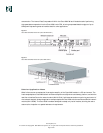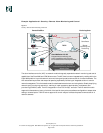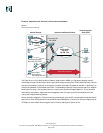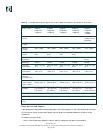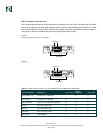
Cisco Systems, Inc.
All contents are Copyright © 1992–2004 Cisco Systems, Inc. All rights reserved. Important Notices and Privacy Statement.
Page 1 of 20
Data Sheet
Cisco 2600-DC Series
Modular Access Platform
Cisco Systems Extends Versatility, Integration, and Power of the Cisco 2600 Series
Modular Access Platform series to Service Provider central offices and Data
Communications Networks.
Figure1
Cisco 2600 Series
Modular Access Routers
As part of a scalable Data Communications
Network (DCN) solution, including the
Cisco Catalyst
®
2950G-24-DC switch,
Catalyst 2924M-XL switch, Catalyst
4003-DC switch, Cisco 3662-AC/DC-CO,
Cisco 3631-CO, and Cisco 2600 Series
modular access platforms, the Cisco 2600
Series supports central office (CO) serial,
X.25 and Internet protocol/open system
interconnection (IP/OSI) interfaces for
operations management inService Provider,
Inter-Exchange Carrier (IXC), and Post,
Telephone and Telegraph (PTT) networks.
The Cisco DCN solution supports
synchronous optical network/synchronous
digital hierarchy (SONET/SDH) network
element (NE) connectivity for alarm
monitoring and control, remote
provisioning, and software download.
Other operations systems network
applications include local number
portability and billing data collection. In
addition, competitive local exchange
carriers (CLECs) can use the Cisco 2600
in small point of presences (POPs) or
central office colocations for digital
subscriber line access multiplexers
(DSLAMs), voice switches, and
transmission operations networking.
New Models in Cisco 2600 DC
Family: 2600XM-DC and
2691-DC
The Cisco 2600XM-DC models provides
the same proven technology of the previous
Cisco 2600 Series platforms, including
Cisco IOS
®
software mainline feature
support and the modularity of Network
Modules (NMs), WAN Interface Cards
(WICs) and Advanced Integration Modules
(AIMs). The Cisco 2691-DC-U model
provides the same module support as the
2600XM, increased performance (up to
70kbps), and even greater density and
scalability.
The modular architecture ofthe Cisco 2600
Series allows interfaces to be upgraded to
accommodate network expansion or
changes in technology as new services and
applications aredeployed. Serviceproviders
can integrate the functions of multiple,
separate devices into a single, compact unit,
thereby reducing the complexity of
managing DCN infrastructures. For
example, the Cisco 2600 Series supports
connectivity to legacy asynchronous and
X.25 devices as well as standards-based





